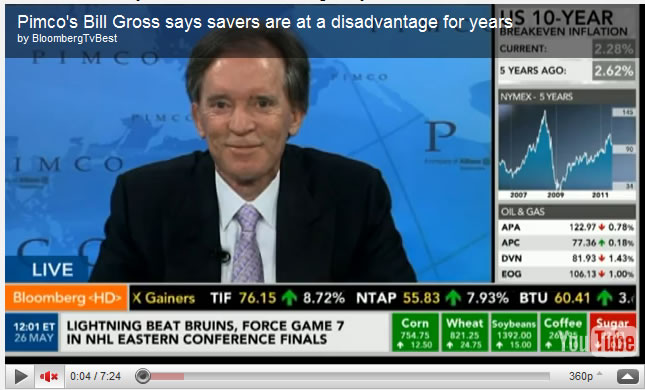Implication of U.S. Low Borrowing Rates for Savers, Don't Cry for PIMCO
Interest-Rates / US Interest Rates May 27, 2011 - 05:50 AM GMTBy: Bloomberg
 PIMCO's Bill Gross spoke to Bloomberg Television’s Tom Keene today. Gross said that “savers are being disadvantaged” 5 to 15 years when compared to creditors, as the U.S. keeps borrowing rates low to reduce its debt burden and that investors should look to corporate bonds instead of U.S. debt.
PIMCO's Bill Gross spoke to Bloomberg Television’s Tom Keene today. Gross said that “savers are being disadvantaged” 5 to 15 years when compared to creditors, as the U.S. keeps borrowing rates low to reduce its debt burden and that investors should look to corporate bonds instead of U.S. debt.
Gross on the implication of U.S. low borrowing rates for savers:
“It means that savers are being disadvantaged and will be disadvantaged for perhaps five, ten to fifteen years relative to debtors."
"What policymakers are trying to do is rebalance this imbalance in terms of too much debt and too attractive rates on savings. What happens since 1946 to 1979 in the UK and the U.S., in order to rebalance balance sheets, was that the U.S. basically kept interest rates at 2.5% for much of that period of time and offered substantially lower real interest rates. That is what will be done here, and basically, it is called financial repression. We call it pocket picking. We simply suggest that investors look into other areas in order to achieve returns. “
On whether consumers should buy equities instead of bonds:
“I think so. Our recent secular forum suggests a bumpy territory…to the extent that G7 countries grow at 2% and to the extent that emerging and developing grow at 5 to 6% and those are our main level assumptions, then equities do make some sense. They do offer real returns in the form of a dividend yield than can grow approximately 1.7 to 2% or more in various countries. Compare that to real rates of interest in the United States on a 7-year on a -1%.”
On whether the Treasury 10-year yield will drop below 3%:
“I don’t think so. We have the end of QE2 at the end of June and that subtracts about $1 trillion of annual purchasing power the Fed will not be buying. I would be the first to admit that there is not enough data because QE1 and QE2 was such a short period of time to suggest what might happen afterwards. I simply think that yields would probably go higher as opposed to lower if only because we wonder who will buy Treasuries when the Fed does not buy Treasuries. At these levels, at these negative real interest rates, let's look to other countries, let's look to corporate bonds as opposed to Treasuries. “
On Pimco’s position in Treasuries:
“We're not overweight Treasuries. We're certainly underweight Treasuries, but that does not mean we don't own lots of other bonds. German bunds and Canadian bonds are rallying. We simply think those are better alternatives. It does not mean as well that we're not a little bit shy in terms of duration. We’re having a good year…so don't cry for Pimco.”
“What we are trying to do is find some countries that are less financially repressed…In the United States, the policy rate at 25 basis points is about 300 basis points less than inflation. That, along with the examples in the UK, are financially repressive, meaning that investors earn a substantial amount less than inflation. We want countries where we can do better than that.”
On whether he sees softening in consumption by the U.S. consumer:
“We continue to see low growth, not just in the U.S., but globally. On a domestic and global basis, I think it is clear we are not building houses for each other and there are not enough jobs to go around."
"It is not that demand is satiable -- it never is. It’s just that the financial system and the stability of existing systems to facilitate it aren’t in working order. Because of that, jobs will go to countries with the cheapest labor and policymakers will tend to make their country the labor market of choice via financial repression and currency depreciation.”
Gross on whether the Great Moderation is over:
“The Great Moderation in terms of steady and high real growth rates is over…What we experienced over the past 30 years in terms of real interest rates is a 10-year that basically traded close to nominal GDP. What we have right now is a 10-year at 3.06, which is trading perhaps 1% to 2% under nominal GDP going forward. Therein lies the difference. Savers are being disadvantaged and it pays them to look for alternatives.”
Copyright © 2011 Bloomberg - All Rights Reserved Disclaimer: The above is a matter of opinion provided for general information purposes only and is not intended as investment advice. Information and analysis above are derived from sources and utilising methods believed to be reliable, but we cannot accept responsibility for any losses you may incur as a result of this analysis. Individuals should consult with their personal financial advisors.
© 2005-2022 http://www.MarketOracle.co.uk - The Market Oracle is a FREE Daily Financial Markets Analysis & Forecasting online publication.




